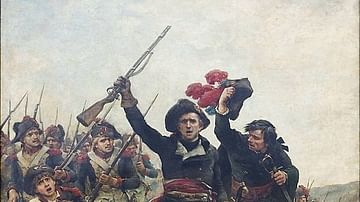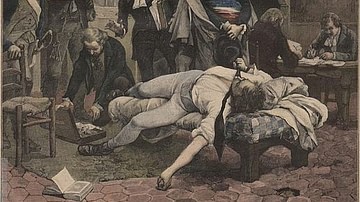Search
Search Results

Definition
Christianity
Christianity is the world's largest religion, with 2.8 billion adherents. It is categorized as one of the three Abrahamic or monotheistic religions of the Western tradition along with Judaism and Islam. 'Christian' is derived from the Greek...

Definition
Sasanian Empire
The Sasanian Empire (224-651 CE, also given as Sassanian, Sasanid or Sassanid) was the last pre-Islamic Persian empire, established in 224 CE by Ardeshir I, son of Papak, descendant of Sasan. The Empire lasted until 651 CE when it was overthrown...

Video
ROBERT II OF SCOTLAND: The first Stewart king of Scotland
Robert II of Scotland, tales from Scotlands history. Who was the first Stewart king of Scotland? Bruce Fummey with Scottish humour and history gives a quick introduction to Robert II, the first Stewart king of Scotland, gives a list of Stewart...

Definition
First Crusade
The First Crusade (1095-1102) was a military campaign by western European forces to recapture the city of Jerusalem and the Holy Land from Muslim control. Conceived by Pope Urban II following an appeal from the Byzantine emperor Alexios I...

Definition
Hildegard of Bingen
Hildegard of Bingen (also known as Hildegarde von Bingen, l. 1098-1179) was a Christian mystic, Benedictine abbess, and polymath proficient in philosophy, musical composition, herbology, medieval literature, cosmology, medicine, biology...

Image
Lazare Carnot at the Battle of Wattignies
French minister of war Lazare Carnot leads a victorious French Republican army during the Battle of Wattignies (15-16 October 1793), a significant engagement in the War of the First Coalition (1792-1797). Although Carnot played a vital role...

Image
Death of General Pichegru
The death of General Jean-Charles Pichegru who allegedly committed suicide in his prison cell after being arrested for plotting against Napoleon in 1804. Image by Georges Moreau de Tours, printed in the Le Petit journal, 4 April 1891. National...

Image
Battle of Günzburg
Death of a French colonel during the Battle of Günzburg (9 October 1805), part of Napoleon's Ulm Campaign (25 September to 20 October 1805), by Georges Moreau de Tours, 1901.

Video
Tulum Ruins Tour: A Must-Do Yucatán Activity
Tulum Ruins Tour: A Must-Do Yucatán Activity Our all-inclusive private tour of Tulum allows visitors to the Riviera Maya to fully explore Tulum’s many archaeological treasures as well as its natural beauty. Every tour group is accompanied...

Definition
Frederick Douglass - American Visionary
Frederick Douglass (circa 1818-1895) was an abolitionist orator, minister, writer, editor, reformer, and statesman, who had been born a slave in Maryland, escaped to New York at around the age of 20, and became a talented orator and writer...